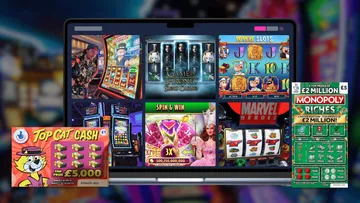As Hasbro announces a raft of new casino partners for its IPs, including Monopoly, Yahtzee and Battleship, and a new Friends slot game launches online exclusively with BetMGM, we take a look at the role of brand licensing in the gambling industry.
Gambling, particularly since it went online, has seen a lot of pushback from regulators and consumers around the world. What was once easily policed in specific locations, is now instantly accessible to everyone with a smartphone. And with this, has also come fiercer competition for attention - there are now a plethora of different sites, apps and ways to engage in gambling each targeted to different groups and interests.
In places like Las Vegas, coincidentally the home of the biggest global licensing show (Licensing Expo), how gambling and licensing interact is easily seen through the sheer number of physical slot machines using licensed properties. From The Wizard of Oz and Game of Thrones, to Tetris and Popeye there is a branded slot machine for every (adult) interest.
Like other age restricted categories, it's important, and legally necessary, to make sure that the licensed properties can’t be seen as enticing those under age into partaking. With older properties though the lines can begin to become a little blurred.
A great example of this is Top Cat. A Hanna-Barbera production, the cartoon lasted just one season of 30 episodes in the early 1960s. Outside of the US it also aired in the UK and across South America in the 60s and 70s and was popular with kids. In 2011, after decades of being off-air, and with no one under 30 likely to even remember it, a licensing deal was done for a Top Cat scratch card with the UK’s National Lottery. That same year a Top Cat movie targeting kids was announced as in production in Mexico and due for release the following year.
Luckily the scratch card had worked its way through its lifecycle and was no longer available by the time the film opened in the UK in the summer of 2012. However it shows how quickly older IPs can be reinvented and brought back for new audiences, versus the length of time it takes many licensing deals to go from agreement to being live.
Similar parallels can be drawn with properties like Marvel, DC and Teenage Mutant Ninja Turtles, that have cross generational appeal. In these cases the location, art style and execution are incredibly important so that they clearly appeal to the older fan boy, and girl, demographic and not to new and younger audiences.
Luckily with tough age restrictions and gatekeeping in place online, licensors can feel more comfortable that their IPs are not accidentally encouraging underage gambling.
However to feel 100% assured, in categories like gambling, it makes sense to use IPs that in no way appeal to kids and luckily there are plenty of them out there. And not only new properties but older IPs that were always adult targeted.
R rated movies, TV shows and video games make the most sense given they are clearly targeted to those over 18, and those from the 1980s and 90s also add in that level of nostalgia that we know works so well in licensing, and appeals to specific fan bases.
Gambling can seem like a risk to many licensors but when the right property is used and by working with responsible partners in this space, it is a legitimate, safe and potentially lucrative area to help drive licensing revenues.
